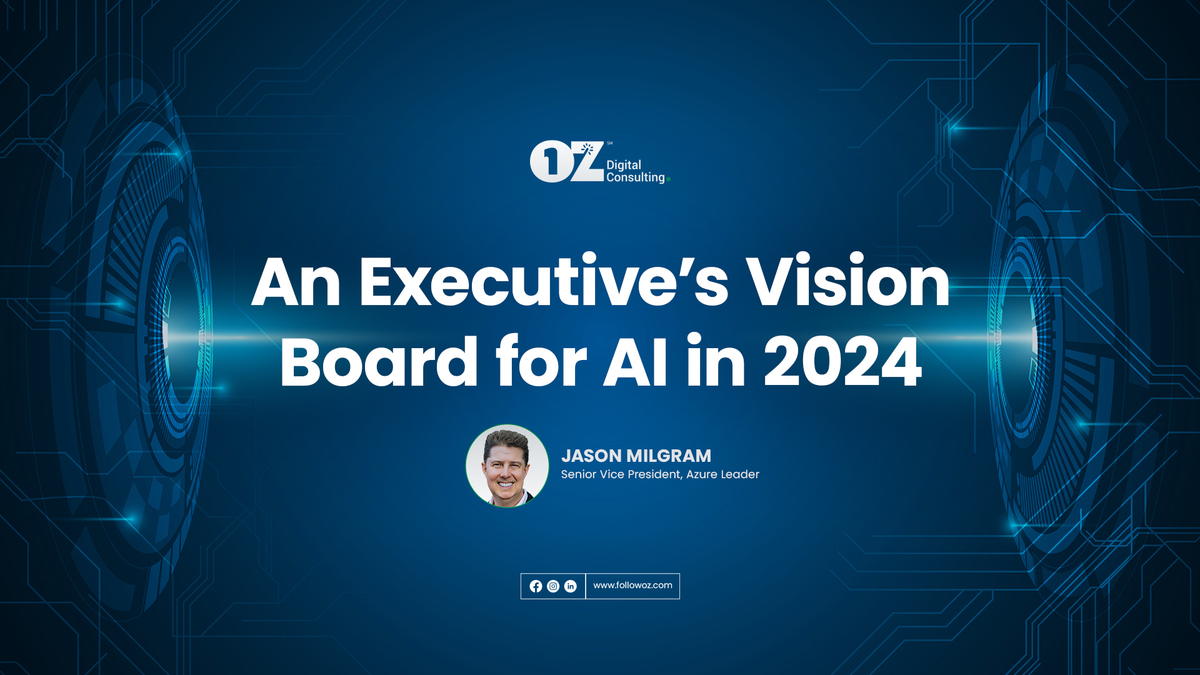By Jason Milgram, Senior Vice President, Azure Leader
The concept of sentient machines—robots, cyborgs, artificial intelligence—has been around since the 20th century. However, the recent leaps in artificial intelligence (AI), fueled by advances in computational power, data availability, and advanced algorithms, have catapulted it into the limelight. Now, with the explosion of AI offerings, AI is no longer an adjunct tool but a central pillar in business planning.
There’s no industry today that AI hasn’t touched. AI is transforming businesses and will continue to play a strategic role in their digital transformation. From predicting market trends to optimizing supply chains, AI’s role in business and strategic planning will only deepen in 2024.
The Role of AI in Modern Business
Initially focused on basic tasks and pattern recognition, AI has advanced to complex problem-solving and predictive analytics, even mimicking human conversation and decision-making processes, transitioning from a theoretical exploration to a practical and indispensable business tool. It’s not just a tech trend anymore but a fundamental component in driving business growth and maintaining competitive advantage in the 21st century.
For business leaders who want to harness AI’s potential, understanding the technology and what it does is the first step.
Let’s begin by examining the various subfields that make up AI:
- Machine Learning (ML): Gets computers to act without being explicitly programmed. ML uses algorithms to parse data, learn from it, and then decide or predict something.
- Natural Language Processing (NLP): It’s the ability of computers to understand and process human language. This technology powers chatbots, translation services, and voice assistants.
- Deep Learning: A subset of ML, deep learning uses neural networks with many layers (hence ‘deep’) to analyze various factors in data. It is a key technology behind advanced image recognition, speech recognition, and natural language processing.
- Robotic Process Automation (RPA): RPA uses AI to automate routine and repetitive tasks, allowing for more efficient and error-free business processes.
Key Advancements in AI
The advancement of AI technology has been rapid and remarkable. Key developments include:
- Increased Computational Power: Enhanced processing capabilities allow more complex calculations at greater speeds, enabling more advanced AI functionalities.
- Big Data Analytics: The ability to process and analyze vast amounts of data has been crucial in training AI systems, making them more accurate and efficient.
- Advancements in Machine Learning Algorithms: Innovations in ML algorithms, especially in deep learning, have significantly improved the performance of AI systems in tasks like pattern recognition and predictive analytics.
- Improvements in Natural Language Understanding: NLP has seen significant progress, allowing machines to understand and respond to human language more accurately.
How AI Will Transform Business Strategy
As AI advances, its impact on business operations and decision-making processes becomes increasingly significant. According to McKinsey, 40% of C-suite executives anticipate spending more on AI in the coming years. That’s because businesses recognize the need to begin integrating AI into their business strategies.
In this section, we explore how AI is revolutionizing various aspects of business strategy, offering enhanced data-driven insights, automating operations for greater efficiency, customizing customer experiences, and fostering innovation in product development.
- Improved Decision Making with Data-Driven Insights
AI’s ability to process and analyze large volumes of data has transformed decision-making processes in businesses:
-
- Predictive Analytics: AI algorithms can predict trends and outcomes based on historical data, allowing businesses to make proactive decisions.
- Risk Assessment: By analyzing patterns and correlations, AI aids in identifying potential risks and devising mitigation strategies.
- Real-Time Decision Making: AI systems can process information in real time, enabling businesses to respond rapidly to market changes and customer needs.
- Automating Operations for Greater Efficiency and Lower Costs
AI is reshaping operational efficiencies through automation:
-
- Process Automation: Routine and repetitive tasks are automated, increasing efficiency and reducing human error.
- Cost Savings: Automation reduces labor and operational expenses, creating a more streamlined and cost-effective business model.
- Resource Allocation: AI enables smarter allocation of resources, freeing up human talent to focus on more complex and strategic tasks.
- Customizing Customer Experiences through AI Analytics
AI plays a crucial role in enhancing customer experience:
-
- Personalized Recommendations: AI analyzes customer data to provide personalized product or service recommendations, improving customer satisfaction.
- Customer Interaction Analysis: By analyzing customer feedback and interactions, AI helps businesses understand customer preferences and improve their offerings.
- Enhanced Customer Support: AI-driven chatbots and virtual assistants provide timely and personalized customer support, improving customer engagement and loyalty.
- AI in Product Development and Innovation
AI’s role in product development and innovation is pivotal:
-
- Accelerating R&D: AI can significantly reduce the time and cost of research and development, bringing innovative products to market faster.
- Enhancing Product Design: By analyzing market trends and consumer preferences, AI aids in designing products that better meet customer needs.
- Quality Control: AI algorithms can detect defects and ensure quality control in manufacturing, resulting in higher-quality products.
- AI in Competitive Strategy
Businesses that adopt AI will have a competitive advantage, whereas companies that wait to adopt AI may never catch up with those that don’t. AI technology offers businesses several avenues to surpass their competition:
-
- Efficiency and Productivity: AI enhances operational efficiency, enabling businesses to achieve more with less, thus reducing costs and increasing productivity.
- Data-Driven Insights: AI’s ability to analyze vast datasets provides businesses with insights that inform strategy, drive innovation, and identify new market opportunities.
- Customer Engagement: AI tools improve customer engagement by personalizing experiences, thus fostering loyalty and increasing customer lifetime value.
Risks and Challenges of Not Integrating AI into Business Strategy
The reluctance to adopt AI can pose significant risks to businesses:
- Losing Competitive Edge: Companies that fail to incorporate AI risk falling behind competitors utilizing AI to optimize their operations and strategies.
- Inefficiency in Operations: Without AI, businesses may struggle with inefficiencies and higher operational costs, which can impact their profitability and market position.
- Missed Opportunities in Market Insights: Lacking AI-driven insights can lead to missed opportunities and poor strategic decisions, as businesses cannot leverage the full potential of their data.
Integrating AI into business strategies is no longer optional but crucial for maintaining competitiveness in today’s market. Companies that effectively leverage AI stand to gain, while those who ignore its potential face the risk of being outpaced by more innovative rivals.
Preparing for an AI-Driven Future
As AI reshapes business, how you prepare for an AI-driven future will determine how far you go. Here are ways to acquire essential skills and knowledge, implement strategies for integrating AI into existing business models, and foster collaboration between human intelligence and AI systems.
To effectively lead in an AI-driven world, you must arm yourself with specific skills and knowledge:
- Understanding of AI Technologies: Leaders should understand AI technologies, their capabilities, and their limitations.
- Data Literacy: Understanding and interpreting data is crucial, as AI-driven decisions rely heavily on data analysis.
- Strategic Thinking: Leaders must develop skills in strategic thinking to leverage AI for long-term business growth and innovation.
- Change Management: Navigating the changes brought about by AI integration requires strong change management skills.
Strategies for Integrating AI into Existing Business Models
Integrating AI into a business model requires a strategic approach:
- Assessing AI Readiness: Businesses should assess their current processes and systems to identify where AI can add the most value.
- Investing in AI Infrastructure: Allocating resources for AI infrastructure, including hardware, software, and talent, is crucial.
- Pilot Projects: Starting with small-scale pilot projects will help you understand the potential impact and tweak strategies accordingly.
- Ongoing Training and Development: Investing in training and development ensures the workforce is prepared and skilled in AI-related technologies.
Collaboration between Human Intelligence and AI
Balancing human intelligence with AI is essential for maximizing the benefits of AI:
- Augmenting Human Capabilities: AI will augment human capabilities, not replace them.
- Cultivating a Collaborative Culture: Fostering a culture where AI and human employees can work collaboratively is essential.
- Ethical Considerations and Governance: Establishing ethical guidelines and governance ensures AI is used responsibly.
- Leveraging AI for Creative Problem Solving: Encouraging teams to use AI for creative problem-solving can lead to innovative solutions and business models.
Preparing for an AI-driven future involves a holistic approach to technology adoption. It includes upskilling leaders, integrating AI into business processes, and fostering synergy between human intelligence and artificial systems. This proactive approach will position businesses to capitalize on the opportunities presented by AI while navigating its challenges.
The Future
As AI’s applications expand, businesses have more avenues to optimize their operations, understand customers better, and innovate. In the future, AI’s role in business will become more integral and far-reaching.
Integrating AI into your business strategy is no longer an option but a competitive necessity. Business leaders must embrace AI as a strategic planning tool, invest in AI infrastructure, upskilling teams, and foster innovation. Success in the future belongs to those who harness the power of AI, aligning it with strategic goals to create more agile, efficient, and forward-thinking organizations.
As a certified Microsoft Solutions Partner, OZ can future-proof your organization through successful AI integration.
Contact us to schedule a free consultation.



